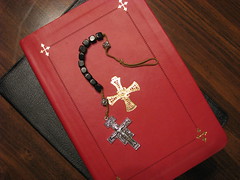I have spent the last year praying my daily prayers from the Roman Office with my parish. Over the years I have used a number of Anglican office books, from the Book of Common Prayer, the Alternative Service Book, Celebrating Common Prayer and Common Worship: Daily Prayer. The traditional Anglican approach to ordering daily prayer might be summed up in the word from the introduction to the Book of Common Prayer
Moreover, the number and hardness of the Rules called the Pie, and the manifold changings of the Service, was the cause, that to turn the Book only was so hard and intricate a matter, that many times there was more business to find out what should be read, than to read it when it was found out.
For Anglicans then, daily prayer has been governed by the aesthetic of the simple; if this is the daily work of the clergy, then it should be likened unto the ploughing of furrows and not bookish cleverness. Of course, traditional Anglican daily prayer can be a thing of great beauty when Solemn Matins (if such a thing still be done) or Evensong is accompanied by a robed choir: simple, yet sublime. The Alternative Service Book 1980 followed this principle of simplicity, but in its updated ‘committee prose’ the business of prayer felt more like it needed to be moved and seconded rather than Amen-ed! The times I prayed the ASB are mostly blanked out as bad memory. Into this spiritual desert we welcomed Celebrating Common Prayer almost lasciviously! Being built through the experience of Anglican Franciscans of the Society of St Francis (SSF) it was tested at the prayer desk. It encouraged Anglicans to think about the occasional Midday or Night Prayer (Compline). It gave us prayer that, while remaining fixed in its shape, moved with the seasons of the liturgical year and flavoured them appropriately with joy or sorrow, hope or conviction. This formed the basis of Common Worship: Daily Prayer, the current standard for the Church of England’s office. E’en so, the Anglican method has always been to take two or three books to the prayer desk: prayer book and Bible, and now the lectionary that reminds us of saints to celebrate and which psalms and readings to use. We Anglicans are not good at knowing our own tradition, so it seems necessary to offer this here as and aide mémoire.
Continue reading “The Anglican tradition of daily prayer, and a year of praying the Roman Office”


